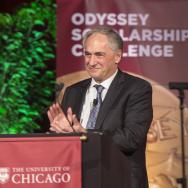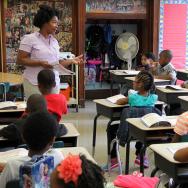Fifty years ago, the University of Chicago became one of the first universities in the nation to partner with the federal government on a suite of programs to help high school students from disadvantaged backgrounds achieve academic success.
UChicago and its Office of Civic Engagement recently celebrated the far-reaching impact of two groundbreaking efforts to help low-income, high-potential Chicago students gain admission to, pay for and thrive in college: the Office of Special Programs-College Prep program, which since 1968 has helped more than 3,000 South Side students prepare and apply for college; and the Collegiate Scholars Program, which in the past 15 years has helped 100 percent of its more than 500 alumni enroll in four-year colleges.
“Ensuring that students from all backgrounds have access and the opportunity to succeed in higher education is a vital priority for the University,” said President Robert J. Zimmer. “The Office of Special Programs is especially focused on providing a system of support and enrichment for young people in the University’s neighboring communities; such programs help first-generation students succeed while strengthening the colleges and universities they choose to attend.”
One College Prep program alum, UChicago second-year Naa Ashitey, knew she would go to college—but she wasn’t sure how she would get there, or how she would afford it. Her father, a taxi driver, works seven days a week; her mother has always cobbled together multiple jobs to help provide for the family.
As a high school student living in the Woodlawn neighborhood on Chicago’s South Side, Ashitey was eligible for the OSP Upward Bound program, which offers year-round academic support, along with help navigating college admissions and financial aid, to students from four communities and four high schools near campus.
The program, which serves more than 100 students each year, helped connect Ashitey with a full-ride QuestBridge scholarship; she’s now on a pre-med academic track and aspires to earn both an MD and a PhD. “I needed to get into college not only to achieve my dream of being a doctor,” she said, “but also to be able to go back and help my family just like they helped me growing up.”
In addition to academic and admissions help, Office of Special Programs activities include annual nationwide college tours and weeklong live-in programs on campus, as well as field trips to cultural events and research institutions. The program also emphasizes the involvement of parents and guardians in students’ journey to college.
Cultivating the potential of Collegiate Scholars
The Collegiate Scholars Program launched after the UChicago Consortium on School Research found that high-performing Chicago Public Schools students were under-reaching in their college application choices. During the academic year, Collegiate Scholars participate in enrichment activities geared toward college readiness, leadership development, cultural awareness and civic engagement. And during the summer months, they experience life on campus while taking humanities, social science, math and science courses taught by University of Chicago faculty and PhD candidates.
Ninety-three percent of program alumni earn bachelor’s degrees within six years; by comparison, 18 percent of Chicago Public Schools graduates earn a bachelor’s degree within a decade of entering high school.
Collegiate Scholar Raven Galloway, a straight-A graduate of Daniel Hale Williams Prep in the Bronzeville neighborhood of Chicago, who’s now a first-year at Rhodes College in Memphis, Tennessee, was accepted to ten colleges and received financial aid offers and scholarships totaling more than $1.3 million. “One of the most important things that CSP gave me was an understanding of how college works,” she said. “It felt like we were high school students and college students at the same time—so I got to Rhodes already knowing how to look at my syllabi, how to handle due dates, how to get to know my professors and ask for help when I need it. All of us in CSP matured during the program and were more prepared for college because of it.”
Both programs are part of UChicago Promise, the University’s multipronged initiative offering college resources and scholarships for Chicago high school students; CSP is endowed through the Odyssey Scholarship Program, UChicago’s comprehensive model for dismantling obstacles to education and careers for talented, hardworking students with financial need.
“The enduring partnership between the University of Chicago and Chicago Public Schools has helped thousands of students prepare for and succeed in college,” said Janice K. Jackson, CEO of Chicago Public Schools. “We look forward to building upon our lasting partnership to help students reach their full potential for generations to come.”
—Adapted from a story that first appeared on the Civic Engagement website.

